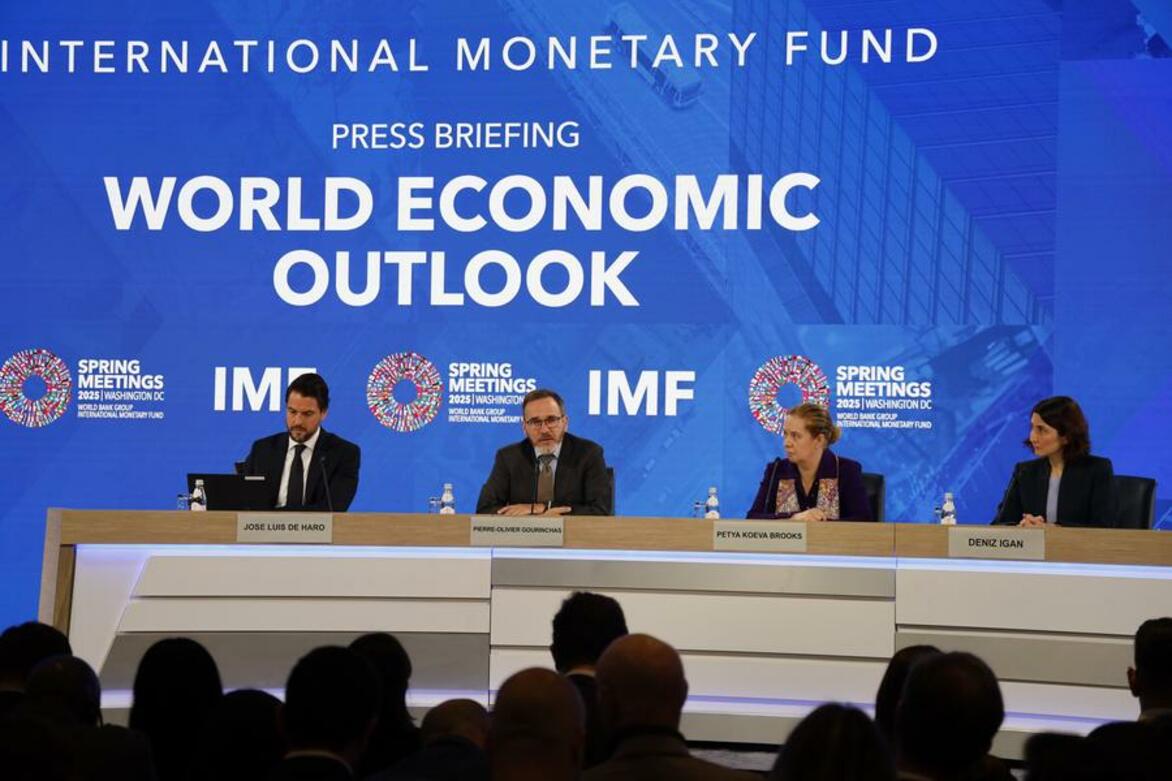Roundup: IMF slashes global growth outlook on impact of heightened tariffs
Xinhua
23 Apr 2025

IMF Chief Economist Pierre-Olivier Gourinchas (2nd L, Rear) speaks at a press briefing on World Economic Outlook (WEO) in Washington, D.C., the United States, on April 22, 2025. (Xinhua/Xie E)"The global economy needs a clear and predictable trading system," said IMF Chief Economist Pierre-Olivier Gourinchas.BEIJING, April 23 (Xinhua) -- In its latest World Economic Outlook (WEO), the IMF downgraded its global growth forecast for 2025 to 2.8 percent, a hefty 0.5 percentage points decrease from its January estimate."Since the release of the January WEO Update, a series of new tariff measures by the United States and countermeasures by trading partners have been announced and implemented," the report said, calling the U.S. reciprocal tariffs announced on April 2 "near-universal" and "not seen in a century.""This on its own is a major negative shock to growth," the IMF said in the executive summary of its April 2025 WEO.Under the reference forecast that incorporates information as of April 4, global growth is projected to drop to 2.8 percent in 2025 and 3 percent in 2026 -- down from 3.3 percent for both years in January's WEO Update and well below the historical (2000-2019) average of 3.7 percent, according to the latest WEO.Growth in the United States is expected to slow to 1.8 percent, 0.9 percentage points lower relative to the projection in January's forecast due to "greater policy uncertainty, trade tensions, and softer demand momentum," the report said.Euro area growth is predicted at 0.8 percent in 2025, 0.2 percentage points lower than the January forecast.Growth in advanced economies is estimated to be 1.4 percent in 2025, while in emerging markets and developing economies, growth is expected to slow down to 3.7 percent.The forecasts are largely in line with economists' expectations. JPMorgan now estimates a 60 percent probability of a U.S. recession. The Federal Reserve has also predicted that growth will weaken this year to 1.7 percent.Noting that rising trade barriers have an immediate impact on growth, IMF Managing Director Kristalina Georgieva on Thursday warned that uncertainty is "costly" amid recent tariff increases."The result? Ships at sea not knowing which port to sail to; investment decisions postponed; financial markets volatile; precautionary savings up. The longer uncertainty persists, the larger the cost," she said."The global economic system under which most countries have operated for the last 80 years is being reset, ushering the world into a new era. Existing rules are challenged while new ones are yet to emerge," IMF Chief Economist Pierre-Olivier Gourinchas said at a press conference.Gourinchas added that the IMF's policy recommendations call for "prudence and improved collaboration.""The first priority should be to restore trade policy stability and forge mutually beneficial arrangements," Gourinchas said. "The global economy needs a clear and predictable trading system."World Bank Group President Ajay Banga speaks at an event during the 2025 Spring Meetings of the World Bank Group (WBG) and the International Monetary Fund (IMF) in Washington, D.C., the United States, on April 22, 2025. (Xinhua/Xie E)Lower tariffs are good for everybody, World Bank Group President Ajay Banga said Tuesday. "History shows that more open economies tend to grow faster and they withstand stocks and shocks more effectively," Banga said.
